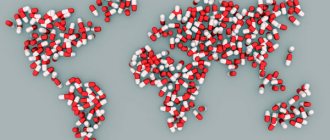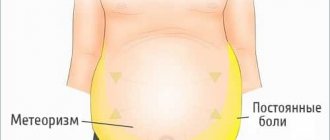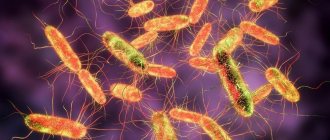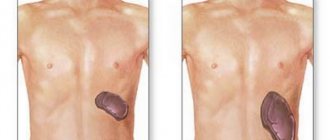In this article we will look at the signs of intoxication of the body in oncology.
Cancer intoxication is a symptom complex that develops in the human body against the background of malignant decay of tumor cells and causes dysfunction of various organs and systems. Most often, intoxication occurs in people with a malignant tumor at stages 3-4 of development. Its development is facilitated by products that are released during the metabolism of the neoplasm and enter the bloodstream. In some cases, intoxication phenomena can occur during antitumor chemotherapy, as well as during the fight against metastases.
Symptoms and treatment of intoxication of the body in oncology are interrelated.
This pathology is characterized by a sharp decrease in the functionality of the immune system and damage to almost all the patient’s internal organs. As a result, the cancer patient’s condition deteriorates greatly, and in the absence of necessary therapy, death can occur. It should be noted that therapy for cancer intoxication is exclusively symptomatic, that is, it only alleviates the symptoms, but does not affect the course of the underlying (oncological) disease.
We will talk about the signs of intoxication of the body during oncology below.
Reasons for the development of pathology
Malignant tumor cells constantly need nutrition with proteins, fats, and saccharides. When a tumor grows rapidly, the vessels are not able to provide it with adequate nutrition, which is why some of the tumor cells begin to die. As a result, the lymph flow and bloodstream are filled with products resulting from the breakdown of the tumor.
Signs of intoxication of the body with intestinal oncology most often occur, as well as with cancer of the blood, brain, lungs, liver, and breast. As a result of chemotherapeutic effects, poisoning of the body occurs, as cancer cells begin to die, releasing large amounts of potassium, phosphates, and uric acid into the blood. This can cause kidney failure and other dangerous complications. Excessive concentration of phosphates leads to a decrease in potassium concentration, which impairs the functionality of the patient's kidneys and vascular system and heart. Poisoning, as a rule, occurs in the last stages of cancer, and therefore this complication often causes death.
How is it diagnosed?
One of the necessary procedures for determining the location of a tumor is taking blood tests for tumor markers.
Stage 4 cancer has quite clear symptoms. But to determine the exact location of the tumor and the presence of secondary foci, it is recommended to undergo an examination. The following methods provide maximum information:
- palpation and physical examination;
- X-ray;
- tissue biopsy of the examined area;
- MRI;
- Ultrasound;
- CT;
- laparoscopy;
- blood test for tumor markers.
For certain types of tumors, narrowly targeted methods are used, such as:
- colonoscopy;
- tracheoscopy;
- gastroscopy;
- endoscopy.
The use of laboratory methods for stage IV cancer helps to establish the sensitivity of cancer cells to the drugs that are planned to treat the tumor.
Types of poisoning
Based on localization, tumor intoxication is classified into several types:
- General. In this case, the toxins secreted by the tumor affect various organs and systems that are located in different parts of the body.
- Local. Intoxication affects the organ or part of the body that is affected by the toxin.
Intoxication is also classified by severity:
- Easy. Such intoxication is well treated and can go away on its own several days after its occurrence.
- Average. It is characterized by long-term effects on organs and systems and is often accompanied by complications.
- Heavy. It is a dangerous form of intoxication. In this case, all systems and organs are affected. The neoplasm begins to rapidly disintegrate, causing the death of the patient.
As a rule, in the last stages of the development of cancer, severe general poisoning develops with damage to the entire body.
Stages of development
At the fourth stage of oncological pathology, intoxication develops as follows:
- The tumor begins to grow rapidly.
- The blood supply deteriorates due to the rapid growth of the tumor.
- Some tumor cells begin to die due to a lack of nutrients.
- Metabolic products of the neoplasm begin to enter the bloodstream.
- Metabolic processes begin to be disrupted.
- Uric acid enters the kidney canals, resulting in kidney failure.
- The body develops dehydration.
- Due to impaired metabolism, the concentration of potassium increases and the calcium content decreases, which deteriorates the functioning of the nervous and cardiac systems.
- A severe form of anemia develops.
- The body becomes infected, sepsis develops, and vital organs stop functioning.
- Death occurs.
After chemotherapy exposure, intoxication develops somewhat differently. Aggressive antitumor medications cause the death of the tumor, which leads to the release of decay products into the blood. This is precisely the reason for the intoxication of the body. Eliminating poisoning that occurs as a result of therapeutic effects is much easier than treating intoxication that develops during the natural decay of a tumor.
Last days
It is important to understand that irreversible changes occur in the body, and the outcome can be anything. Relatives should know what characteristic symptoms appear before death:
- Predagonia: hallucinations;
- pale skin;
- low pressure.
- loud wheezing;
In recent days, a cancer patient may faint under the influence of painkillers. Despite his comatose state, he can hear, so it is important for his family to tune in psychologically and support him with conversation and positive memories. And if the pain sensations can no longer be controlled, you need to be patient and, when you are nearby, show maximum care.
Signs of intoxication of the body in oncology
Cancer poisoning is characterized by a variety of symptoms, but they do not differ in specificity.
Asthenia manifests itself as:
- Strong, growing weakness.
- Fatigue that occurs even with minor exertion.
- Mental disorders, for example, irritability, depression, apathy, and other similar disorders.
How does intoxication of the body manifest itself in oncology? It may differ in external changes:
- Loss of body weight, development of severe exhaustion.
- Increased sweating, especially at night.
- Paleness of the skin, its blueness, yellowing.
- Dry skin, mucous membranes.
The disease is accompanied by dyspeptic disorders, including:
- Constipation.
- Constant vomiting.
- Attacks of nausea.
- Aversion to food that was previously a favorite.
What other symptoms of body intoxication in oncology are there? Other signs, depending on the location of the tumor process, may include:
- Thrombosis.
- Arrhythmic phenomena.
- Iron-deficiency anemia.
- Persistent infectious lesions as a result of severe suppression of the immune system.
- Soreness in musculoskeletal structures.
- Hyperthermia.
If signs of cancer poisoning occur, you should consult a doctor to be examined for serious pathologies, including cancer.
Diagnosis of cancer intoxication
As a rule, a person’s cancer is diagnosed even before intoxication begins to develop. But in some situations, such a complication may come as a surprise to the patient, since with rapidly growing and aggressive tumors, fatal poisoning can occur even before the tumor is detected. In such cases, the patient visits the doctor for the first time, having already advanced cancer pathology.
To establish a diagnosis, oncologists use laboratory and instrumental research methods:
- Laboratory tests of blood and urine samples (general clinical, biochemical, to identify tumor markers).
- X-ray examination.
- Ultrasonography.
- MRI, CT.
- Biopsy, subsequent histology of the obtained material.
Depending on where the tumor is located, the doctor may recommend other measures to diagnose the pathology.
How to deal with intoxication of the body due to oncology?
Therapy
Therapeutic effects in case of cancer poisoning are primarily aimed at eliminating the tumor and stopping the process of tumor disintegration. If possible, the patient is prescribed surgical intervention, during which the surgeon eliminates foci of poisoning and metastases. In cases where surgical treatment is contraindicated, radiation and chemotherapy are used. Treatment of cancer intoxication is aimed, first of all, at removing toxic substances from the body, reducing the severity of negative manifestations after chemotherapy, and correcting metabolism.
To relieve symptoms, the following pharmacological agents are allowed:
- Drugs that eliminate mental disorders.
- Painkillers.
- Vitamin complexes.
- Antiemetic drugs.
- Means that help normalize intestinal activity.
- Iron-based preparations.
- Enterosorbents.
In case of intoxication, it is recommended to adhere to a dairy-vegetable diet.
Treatment
Therapeutic measures for cancer intoxication are primarily aimed at eliminating the tumor and stopping the decay of the tumor. If possible, an operation is performed during which the doctor removes the source of poisoning and metastatic tumors. If there are contraindications to surgical intervention, radiation and chemical therapy are performed. Treatment of cancer poisoning is aimed at eliminating toxins from the body, correcting metabolism and reducing the side effects of chemotherapy.
We recommend reading The concept of cachexia in oncology, its causes, types and symptoms
To relieve symptoms, you can take the following medications:
- enterosorbents;
- iron supplements;
- means for normalizing intestinal function;
- anti-vomiting medications;
- vitamin complexes;
- painkillers;
- remedies for mental disorders.
In case of intoxication, a predominantly dairy-vegetable diet is preferable.
Forced diuresis
This treatment is used to thin the blood. The patient is infused intravenously with glucose, albumin, and sodium bicarbonate in large quantities. After sufficient filling of the body with fluid, the person is prescribed diuretics. During therapy, the doctor is required to monitor the functioning of the patient’s lungs and heart.
Peritoneal dialysis
Through small incisions in the patient's abdomen, drainage is installed and the body is cleansed of toxic substances. On the first day of treatment, the patient is given drainage lavage with at least twenty liters of water.
Enterosorption
To eliminate the toxic factor during intoxication, the patient is prescribed large doses of adsorbent drugs. The duration of therapy is five days, and the dosage of drugs is one gram of sorbent per kilogram of the patient’s body weight.
Detoxification
Detoxification treatment is carried out when a person is critically ill. The method of detoxification therapy for oncology involves injections of the drug Reamberin, the main component of which eliminates the signs of hypoxia and tissue poisoning. In addition, the drug helps restore acid and water-electrolyte balance.
Indirect blood oxidation
If the neoplasm affects several organs of the patient, then sodium hypochloride is injected into the person’s vein. The method of blood oxidation gives a good effect if the tumor or its metastases have affected the pancreas, kidneys, and liver.
Hemodialysis and filtration methods
This method is rarely used due to the fact that it is contraindicated in the final stages of cancer pathology, which is rare in cancer intoxication. In addition, treatment in this way can only be done in cases of very low levels of bicarbonates in the blood. During therapy, the patient is connected to an “artificial kidney” apparatus, as a result of which toxins are washed out of the body and fluid is replenished.
Hemosorption
The therapy involves passing the patient's blood through a special device with a sorbent, as a result of which it is purified, after which it is reintroduced into the human body intravenously. This method is contraindicated in cases of bleeding, dehydration, severe hypotension, multifaceted insufficiency, as well as in patients with problems with the functioning of the cardiovascular system.
Plasmapheresis
Intoxication of the body with tumor decay products is carried out by replacing blood plasma. To achieve a good result, doctors perform at least four plasmapheresis procedures. Protein solution or polyglucin are used as substitutes.
Recommended reading: Terminal stage of cancer
Filtration methods, hemodialysis
This technique is used quite rarely, since it is contraindicated in the last stages of the development of cancer pathology. In addition, this therapeutic method can only be used if the patient has a greatly reduced concentration of bicarbonates in the blood. Treatment of signs of intoxication of the body in oncology involves connecting the patient to an artificial kidney apparatus. In this way, toxins are flushed out of the body and the lack of fluid is replenished.
general information
Each specific case is unique, as is the disease itself. Above we have already fully revealed the main issue of the topic, and here we will only once again dive a little more into the main problems and features associated with the disease.
Until now, science does not know the exact causes of the disease. There are quite a few theories on this matter, but what remains unshakable is that doctors identify the main risk factors that influence the onset of the disease. Here are some of them:
- Heredity - if you have people in your family with cancer pathologies, you are automatically at risk.
- Smoking and alcohol - bad habits always go hand in hand with diseases, especially cancer.
- The external environment is simply the background radiation and ecology of the environment, the environment in the workplace (for example, harmful chemical and radiation exposure), and also possible frequent exposure to ultraviolet radiation (sunbathers and solariums).
These 3 main factors appear in all cancers, which means they probably influence the mutation of cells into malignant ones. I control them, and competent prevention can be organized. But our article is not about that.
Hemosorption
This therapeutic method involves filtering the patient’s blood using a special device with a sorbent. The result of this effect is blood purification. The purified blood is then reintroduced into the human body through an intravenous route. This technique is contraindicated in cases of impaired functionality of the vascular and cardiac systems, multiple organ failure, severe hypotension, dehydration, and bleeding.
How long do they live when the body is intoxicated due to oncology?
Esophageal cancer: stages
There are 4 stages of esophageal cancer:
- First stage . There are no clinical signs, there is discomfort when swallowing.
- Second stage . Stage 2 esophageal cancer: problems with eating begin, the person switches to cereals and purees. Esophageal cancer stage 2, how long do you live? You should ask your doctor.
- Third stage . When you have stage 3 esophageal cancer, how long do you live? When there is stage 3 esophageal cancer, the prognosis is disappointing. The organ narrows, the process of swallowing is accompanied by pain.
- Esophageal cancer stage 4 . Complete obstruction of the organ.
The disease of 1st and 2nd degrees is dangerous due to mild symptoms. If it is possible to identify the process, the treatment prognosis is favorable. At stages 3 and 4, metastases are observed in the regional lymph nodes, the process becomes irreversible, and treatment does not produce results.
Prevention and prognosis
Due to the fact that cancer intoxication, as a rule, develops in the last stages of cancer, its prognosis in almost every case is not comforting. Patients with cancer often wonder how long they can live with cancer intoxication. If this complication is treated in a timely manner, the patient’s life can be extended by several months, and sometimes years. A person should never neglect the advice of a doctor and become depressed.
It is imperative to undergo treatment in a hospital, follow the recommended diet, and a rational rest and work schedule.
In order to prevent signs of intoxication of the body in intestinal oncology, it is recommended to monitor the content of electrolytes in the blood plasma, monitor the functionality of the kidneys and liver, and periodically take blood samples for testing for coagulation and hemoglobin. In case of cancer, the development of cancer poisoning can be slowed down by proper nutrition, drinking sufficient amounts of water, and timely bowel movements. Such recommendations are especially important during therapy with chemical medications.
In case of intoxication, death can be caused by complications such as sepsis, infections, thrombosis, cardiac arrest, and rapidly developing renal failure. Early diagnosis of the causes and symptoms of cancer intoxication and adequate therapy can not only prolong, but also save the patient’s life.
Impact on life expectancy
Now let’s look at what exactly affects life expectancy. After all, stage 4 is not always the same.
- The most important indicator is the location of the tumor. Above you have already seen a list of specific types of oncology and their five-year survival rate. But not only the localization is important, but also the form of the course - for example, with pancreatic cancer, a lot depends on it.
- Treatment. The treatment carried out may depend not only on the attending oncologist (although they are not omnipotent in the fight against such a disease, you should not judge them), but also on the supply of the clinic with the necessary equipment and drugs, and most importantly, on the personal digestibility of the treatment by the body. After all, the same treatment affects everyone completely differently.
- Internal mood. Did you think it didn’t matter and were already prepared to die? Nothing will come of it until your time comes, you will have to fight and move forward in this difficult war. The proven effect of Placebo can help here too, so it is very important to set the patient on the right wave and motivate him until his last breath. With such a fighting spirit, all illnesses can be easily overcome.
- General health, diseases and immunity of the body. This is also an important factor, because cancer takes so much energy that you have to squeeze all the available resources out of the body. And there’s nothing to say about immunity - it’s what should help the body finish off bad cells and heal completely. If everything was initially bad with this, the chances of success are also not high.
- Metastases – stage 4 cancer is characterized by widespread metastases. And this, consider, is the same cancer, which again obeys the higher criteria. And here again it becomes important where they are localized, because the success of the overall healing of the body directly depends on this. So there are approximate life spans for organs affected by metastases: brain - 2 weeks, liver - 6 months, lungs - 3 years. But remember, these are all average numbers, and they can deviate both downwards and upwards











